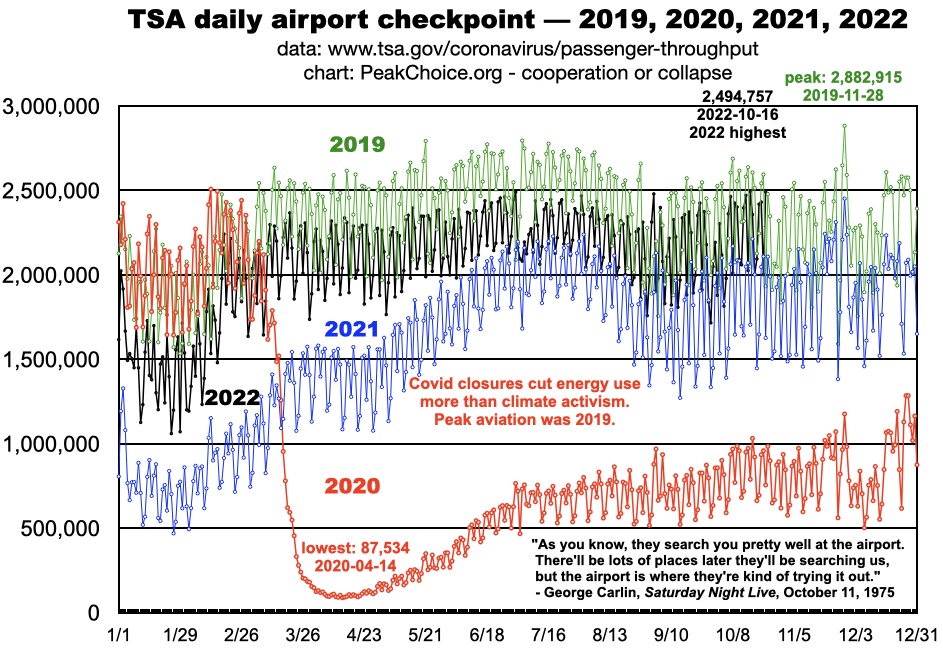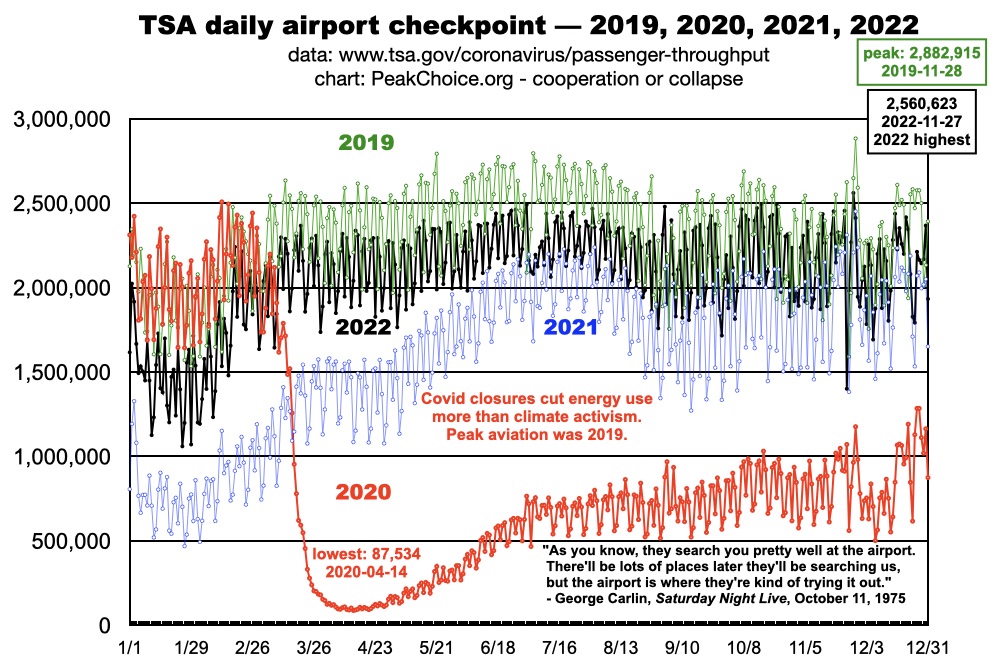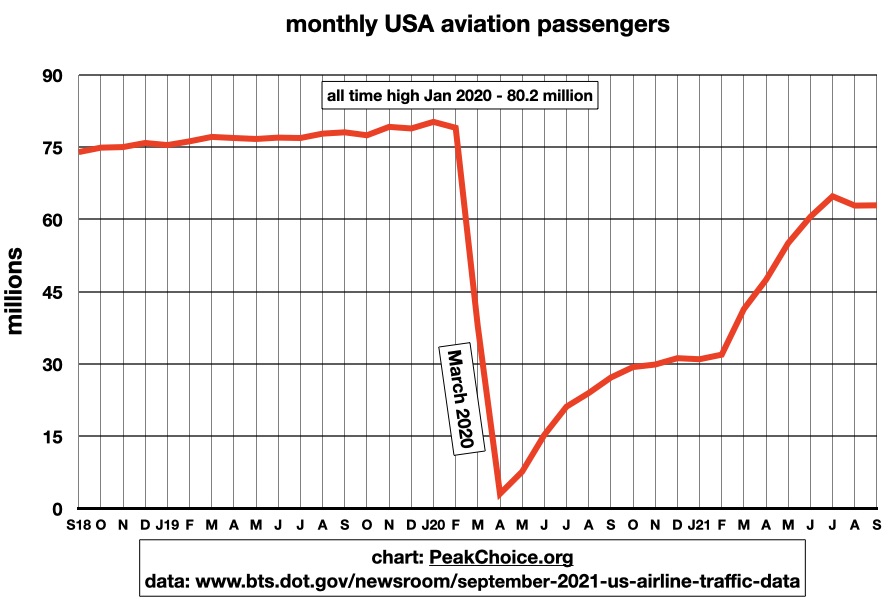Peak Airplanes
related pages:
Covid closures caused the sharpest drop of travel in aviation history



www.resilience.org/stories/2016-02-16/how-far-can-we-get-without-flying
I’m a climate scientist who doesn’t fly. I try to avoid burning fossil fuels, because it’s clear that doing so causes real harm to humans and to nonhumans, today and far into the future. I don’t like harming others, so I don’t fly. Back in 2010, though, I was awash in cognitive dissonance. My awareness of global warming had risen to a fever pitch, but I hadn’t yet made real changes to my daily life. ...
However, the total climate impact of planes is likely two to three times greater than the impact from the CO2 emissions alone. This is because planes emit mono-nitrogen oxides into the upper troposphere, form contrails, and seed cirrus clouds with aerosols from fuel combustion. These three effects enhance warming in the short term. (Note that the charts in this article exclude these effects.)
Given the high climate impact, why is it that so many environmentalists still choose to fly so much? I know climate activists who fly a hundred thousand miles per year. ...
In the post-carbon future, it’s unlikely that there will be commercial plane travel on today’s scale. Biofuel is currently the only petroleum substitute suitable for commercial flight. In practice, this means waste vegetable oil, but there isn’t enough to go around. In 2010, the world produced 216 million gallons of jet fuel per day but only about half as much vegetable oil, much of which is eaten; leftover oil from fryers is already in high demand. This suggests that even if we were to squander our limited biofuel on planes, only the ultra-rich would be able to afford them.
note from Mark: there's a consortium in Washington State trying to figure out how to turn trees into jet fuel, which would radically accelerate deforestation (and therefore, climate chaos).
https://thebiomassmonitor.org/2016/09/05/opinion-the-high-flown-fantasy-of-aviation-biofuels/
[OPINION] THE HIGH-FLOWN FANTASY OF AVIATION BIOFUELS
Posted on September 5, 2016 by TheBiomassMonitor
– by Almuth Ernsting, Co-Director, Biofuelwatch
On 24th February 2008, pictures of Richard Branson tossing a coconut into the air next to an aircraft at Heathrow were broadcast around the world, as he announced the world’s first biofuel flight. Biofuel, he claimed, would “enable those of us who are serious about reducing our carbon emissions to go on developing the fuels of the future.”
Environmental NGOs denounced his test flight as a publicity stunt, intended to deflect attention from the fact that aviation is one of the fastest growing sources of greenhouse gas emissions worldwide, and most carbon intensive form of transport. As far as Branson and his airline, Virgin Atlantic, were concerned, the flight was indeed no more than a stunt: The “biofuel test flight” burned 95% ordinary kerosene and just 5% biofuels, made from coconut and Brazilian babassu nut oil. Virgin Atlantic has not used any biofuels since that day.
Since then, however, at least 24 other airlines have blended biofuels with kerosene. By September 2015, more than 2,050 such flights had taken off, most by commercial airlines, some by the US and Dutch military and US and Canadian research institutes. This year, KLM has launched a series of 80 passenger flights with biofuel blends, and since March, United Airlines has been using such blends for regular flights between Los Angeles and San Francisco. They aim to expand their use to all their flights out of Los Angeles. Across the aviation industry, biofuel use and investments have moved far beyond what could be considered a mere publicity stunt. ....
http://holmgren.com.au/why-i-havent-been-flying-much/
Why I haven't been flying (much)
by David Holmgren on May 16, 2013
the plane truth about flying and climate
www.chooseclimate.org (flying off to a warmer climate)
www.cartome.org/9-11climatology.htm
www.energyjustice.net/content/southwest-airlines-use-forest-biofuels
Southwest Airlines to Use Forest Biofuels
- by Terry Maxon, December 31, 2014, Dallas Morning News
Southwest Airlinesannounced Wednesday that it plans to buy some biofuels made from waste wood, for use in its San Francisco Bay airports beginning in two years.
To use Southwest's phrasing, it is purchasing “low carbon renewable jet fuel, made using forest residues that will help reduce the risk of destructive wildfires in the Western United States.”
It has agreed to buy about 3 million gallons a year from Red Rocks Biofuels, a Fort Collins, Colorado, that focused on recycling that foresty stuff.
That won't provide much of Southwest's needs.
he Dallas carrier in 2013 bought 1,818 million gallons, so 3 million gallons would represent 0.2 percent of its needs or about 60 percent of an average day's usage.
But it might make a noticeable portion of the fuel needs at Southwest's Bay airports — San Francisco, Oakland and San Jose — where the fuel will be delivered beginning in 2016.
“Our commitment to sustainability and efficient operations led us on a search for a viable biofuel that uses a sustainable feedstock with a high rate of success,” said Bill Tiffany, Southwest's vice president of supply chain.
“Red Rock Biofuel's technology, economics and approved use made entering into an agreement for purchase a win-win situation,” he said.
“From the outset, we have sought to build the best possible team of project partners,” Red Rock CEO Terry Kulesa said.
“A conversation we started with Southwest on the premise of providing renewable jet fuel at cost parity with conventional jet fuel has evolved into a great partnership.
“We're happy to help Southwest diversify its fuel supply,”Kulesa said.
According to the announcement, “RRB's first plant will convert approximately 140,000 dry tons of woody biomass feedstock into at least 12 million gallons per year of renewable jet, diesel, and naphtha fuels.”
How can you turn humus, plant duff and twigs into fuel to fly a commercial airplane?
Here's Red Rock's explanation from its website:
“RRB's technology platform converts woody biomass to jet, diesel, and naphtha fuels. Our process begins with the gasification of woody biomass to produce synthesis gas.
“This synthesis gas is cleaned and sent to a Fischer-Tropsch unit where it is converted to liquid hydrocarbons.
“Hydroprocessing refines the liquid hydrocarbons to produce jet, diesel and naptha fuels.”
Red Rock has received a $70 million grant from the U.S. Department of Energy to build a “biorefinery” at Lakeview, Oregon, near the intersection of California, Nevada and Oregon and close to Fremont National Forest.
Peak Air Travel
www.fcnp.com/national_commentary/the_peak_oil_crisis_the_half-life_for_air_travel_20080501.html
In recent weeks, airlines around the world have been reporting substantial losses, declaring bankruptcy or completely shutting down. So far the losses have been mostly of small airlines, but many of the large ones have started to thrash around for merger partners. At $3.71 a gallon, jet fuel is now the single largest expense an airline faces.
In 2000, the airlines fuel bill was $14 billion. It is now pushing $60 billion and climbing. Southwest, the most profitable carrier, recently announced that this year’s fuel bill will be $500 million more than last year and equal to 2007 profits. During the first quarter of 2008 American airlines lost $328 million; Delta lost $274 million; United lost $537 million; Continental $80 million; Northwest $191 million; and US Airways $236 million. Only Southwest Airlines, which did a better job of hedging its fuel than the others, made a profit.
It is clear we are going to see major changes in air travel shortly.
www.globalpublicmedia.com/saying_goodbye_to_air_travel
Saying Goodbye to Air Travel
14 May 2008
by Richard Heinberg
The airline industry has no future. The same is true for airfreight. No air carrier has a viable plan to make a profit with oil at current prices—much less in years to come as the petroleum available to world markets dwindles rapidly.
That’s not to say that jetliners will disappear overnight, but rather that the cheap flights we’ve seen in the past will soon be fading memories. In a few years jet service will be available only to the wealthy, or to the government and military.
Sir Richard Branson of Virgin Atlantic says he wants to use biofuels to power his fleet of 747’s and Airbuses. There are still some bugs to be worked out in terms of basic chemistry, but it might be possible in principle—if only we could make enough biodiesel or ethanol without further driving up food prices and wrecking the soil. Even then it would be very costly fuel.
Are there other options for powered flight?
Hydrogen could be burned in jet engines, but doing so would require a complete redesign of our commercial aircraft fleet, and H2 would be expensive to make—unless the growing trend toward more costly electricity (as we phase out depleting, polluting coal and increasingly scarce natural gas) can somehow be reversed.
Last year I was invited to give the keynote address at the world’s first Electric Aircraft Symposium. NASA and Boeing sent representatives, but all told there were only about 20 in attendance. The planes being discussed were ultralight two-seaters: that’s the limit of current or foreseeable battery technology. These might come in handy in a future where they are the only option for emergency air travel (blimps need depleting helium or explosive hydrogen). But forget about 300-seat planes running on solar or wind power, ferrying middle-class vacationers to Bali or Venice.
There are good reasons to cut down on air travel voluntarily: flying not only swells our personal carbon emissions but spews CO2 and other pollutants into the stratosphere, where they do the most damage. However, the worsening scarcity of the stuff we use for making jet fuel takes the discussion out of the realm of optional moral action and into that of economic necessity and personal adaptation.
I fly to educate both general audiences and policy makers about fossil fuel depletion; in fact, I’m writing this article aboard a plane en route from Boston to San Francisco. I wince at my carbon footprint, but console myself with the hope that my message helps thousands of others to change their consumption patterns. This inner conflict is about to be resolved: the decline of affordable air travel is forcing me to rethink my work. I’m already starting to do much more by video teleconference, much less by jet.
Those who live far from family will be more than inconvenienced, as will the hundreds of thousands who work for the airline industry directly or indirectly, or the millions who depend on tourism or airfreight for an income. These folks will have few options: teleconferencing can accomplish only so much.
Our species’ historically brief fling with flight has been fun, educational, and enriching on many levels to those fortunate enough to benefit from it. Saying goodbye will be difficult. But maybe as we do we can say hello to greater involvement in our local communities.
Toronto Star
www.thestar.com/News/Ideas/article/471491
The End of Travel
High oil prices are crippling airlines and travellers alike and we may only be at the start of a new, global class divide between the stranded and the mobile
Aug 02, 2008
NICOLE BAUTE
High oil prices are crippling airlines and travellers alike and we may only be at the start of a new, global class divide between the stranded and the mobile.
In Europe's late medieval period, the labouring masses rarely travelled further than a few dozen miles from where they were born. For them, travel was dangerous, onerous and slow.
But wealthy aristocrats travelled far and wide in the name of diplomacy, meeting leaders from other countries and extending their power and influence.
For Steven Flusty, an associate professor of geography at York University, this is what society could once again look like if predictions that the lower-middle classes will no longer be able to afford to fly in just a few years come true.
It would be tremendously debilitating and could wind up "breaking down everything below a certain class level, where they are being held in space as if it's some kind of a container," he says.
The North American airline industry is under siege, with exorbitant fuel costs, a slowing economy and competition from Asia and the Middle East leading to employee layoffs and flight reductions.
Within a year or two, insists writer James Howard Kunstler and others, it will all be over. They predict the demise of the commercial airline industry as it currently exists.
And then, like in the medieval age, society will split into two groups: the mobile, and the stranded. [...]
www.walrusmagazine.com/print/2008.07-travel-grounded-travel-by-air-david-beers/
Grounded
Imagining a world without flight
by David Beers
Walrus magazine, Toronto, Ontario, Summer 2008 issue
